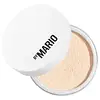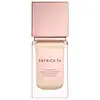Makeup by Mario Surrealskin Soft Blur Setting Powder Versus Patrick Ta Major Skin Hydra-Luxe Luminous Skin Perfecting Foundation
What's inside
What's inside
 Key Ingredients
Key Ingredients

 Benefits
Benefits

 Concerns
Concerns

 Ingredients Side-by-side
Ingredients Side-by-side

Synthetic Fluorphlogopite
Mica
Cosmetic ColorantSilica
AbrasiveLauroyl Lysine
Skin ConditioningKaolin
AbrasiveMagnesium Myristate
Zinc Stearate
Cosmetic ColorantDimethicone
EmollientSqualane
EmollientTetrahexyldecyl Ascorbate
AntioxidantPotassium Sorbate
PreservativeCaprylyl Glycol
Emollient1,2-Hexanediol
Skin ConditioningCI 77491
Cosmetic ColorantCI 77492
Cosmetic ColorantCI 77499
Cosmetic ColorantCI 77742
Cosmetic ColorantWater
Skin ConditioningGlycerin
HumectantIsononyl Isononanoate
EmollientPropanediol
SolventDicaprylyl Ether
EmollientSqualane
EmollientPentaerythrityl Tetraisostearate
EmollientHydrogenated Styrene/Methylstyrene/Indene Copolymer
Hydrogenated Ethylhexyl Olivate
EmollientPolyglyceryl-6 Polyricinoleate
EmulsifyingPolyglyceryl-2 Dipolyhydroxystearate
Skin ConditioningIsostearyl Neopentanoate
EmollientC9-12 Alkane
SolventDimer Dilinoleyl Dimer Dilinoleate
EmollientPolyglyceryl-2 Isostearate
EmulsifyingPvp
Emulsion StabilisingLauroyl Lysine
Skin ConditioningDipalmitoyl Hydroxyproline
Skin ConditioningMyristyl Myristate
EmollientMagnesium Sulfate
Disteardimonium Hectorite
StabilisingLecithin
EmollientPhenoxyethanol
PreservativePropylene Carbonate
SolventZinc Stearate
Cosmetic ColorantOctyldodecyl Stearoyl Stearate
EmollientHydrogenated Lecithin
EmulsifyingButyrospermum Parkii Butter
Skin ConditioningSodium Benzoate
MaskingSaccharomyces/Xylinum/Black Tea Ferment
Skin ConditioningDistarch Phosphate
AbsorbentAllantoin
Skin ConditioningHydrogenated Olive Oil Unsaponifiables
EmollientCoco-Caprylate/Caprate
EmollientTocopherol
AntioxidantSodium Hyaluronate
HumectantSodium Dehydroacetate
PreservativeHelianthus Annuus Seed Oil
EmollientPentaerythrityl Tetra-Di-T-Butyl Hydroxyhydrocinnamate
AntioxidantPotassium Sorbate
PreservativeCI 77891
Cosmetic ColorantIron Oxides
Water, Glycerin, Isononyl Isononanoate, Propanediol, Dicaprylyl Ether, Squalane, Pentaerythrityl Tetraisostearate, Hydrogenated Styrene/Methylstyrene/Indene Copolymer, Hydrogenated Ethylhexyl Olivate, Polyglyceryl-6 Polyricinoleate, Polyglyceryl-2 Dipolyhydroxystearate, Isostearyl Neopentanoate, C9-12 Alkane, Dimer Dilinoleyl Dimer Dilinoleate, Polyglyceryl-2 Isostearate, Pvp, Lauroyl Lysine, Dipalmitoyl Hydroxyproline, Myristyl Myristate, Magnesium Sulfate, Disteardimonium Hectorite, Lecithin, Phenoxyethanol, Propylene Carbonate, Zinc Stearate, Octyldodecyl Stearoyl Stearate, Hydrogenated Lecithin, Butyrospermum Parkii Butter, Sodium Benzoate, Saccharomyces/Xylinum/Black Tea Ferment, Distarch Phosphate, Allantoin, Hydrogenated Olive Oil Unsaponifiables, Coco-Caprylate/Caprate, Tocopherol, Sodium Hyaluronate, Sodium Dehydroacetate, Helianthus Annuus Seed Oil, Pentaerythrityl Tetra-Di-T-Butyl Hydroxyhydrocinnamate, Potassium Sorbate, CI 77891, Iron Oxides
 Reviews
Reviews

Ingredients Explained
These ingredients are found in both products.
Ingredients higher up in an ingredient list are typically present in a larger amount.
This ingredient comes from a fatty acid (lauric acid) and amino acid (lysine). It is used to add a silky feel to cosmetics.
According to a manufacturer, its fatty acid base leaves a silky feeling on the skin. It also has emollient properties because of this. Emollients help soften skin by preventing water from evaporating.
Lauroyl lysine is barely soluble in water.
Learn more about Lauroyl LysinePotassium Sorbate is a preservative used to prevent yeast and mold in products. It is commonly found in both cosmetic and food products.
This ingredient comes from potassium salt derived from sorbic acid. Sorbic acid is a natural antibiotic and effective against fungus.
Both potassium sorbate and sorbic acid can be found in baked goods, cheeses, dried meats, dried fruit, ice cream, pickles, wine, yogurt, and more.
You'll often find this ingredient used with other preservatives.
Learn more about Potassium SorbateSqualane is an emollient that helps the skin hold onto moisture. It's an oily liquid that occurs naturally in certain types of fish and plant oils.
Because squalane boosts hydration in the skin, it also comes with plenty of benefits: it is an antioxidant and can help fight free radicals and skin damage. Squalane is also found to have a detoxifying effect when applied.
Squalane comes from squalene, which occurs naturally within the sebum of our skin. It is one of the oils our skin produces to keep itself hydrated. Squalane is the hydrogenated version of squalene and has a longer shelf life.
Research shows that squalane is non-irritating (even at 100% concentration).
In general, it's a fantastic ingredient. It does a great job at hydrating the skin, and it's suitable for those with sensitive skin.
The source of squalane may impact malassezia / fungal acne. This is because olive oil derived squalane can contain impurities such as fatty acids and plant waxes. Sugarcane derived squalane is recommended for anyone with malassezia concerns.
Is squalane vegan?
This depends on the source. Squalane can be derived from both plants and animals. Most squalane used in skincare comes from plants.
Please note: the source of squalane is only known if disclosed by the brand. We recommend reaching out to the brand if you have any questions about their squalane.
Read more about squalene with an "e".
Is squalane an oil?
Squalane is often called an oil, but it’s technically not; it’s a hydrocarbon, meaning it’s only made of carbon and hydrogen, unlike true oils which are triglycerides made of fatty acids and glycerol.
The term “oil-free” isn’t regulated, so companies can define it however they want. Some exclude all oils, while others just avoid mineral oil or comedogenic oils.
While some people avoid oils thinking they cause breakouts, the right kind of oil (or oil-like ingredient like squalane) can actually help balance and hydrate your skin. It’s worth testing out simple oils or squalane to see what works best for your skin.
Learn more about SqualaneZinc Stearate is the metal salt of stearic acid. It is a white solid used to bind, thicken, and lubricate products.
This ingredient is common in powder makeup, where it helps keep the powder together.
Zinc Stearate is hydrophobic and repels water.
This ingredient can be sourced from non-animal or animal sources. It is best to reach out to the brand to see where they source this ingredient from.
Learn more about Zinc Stearate